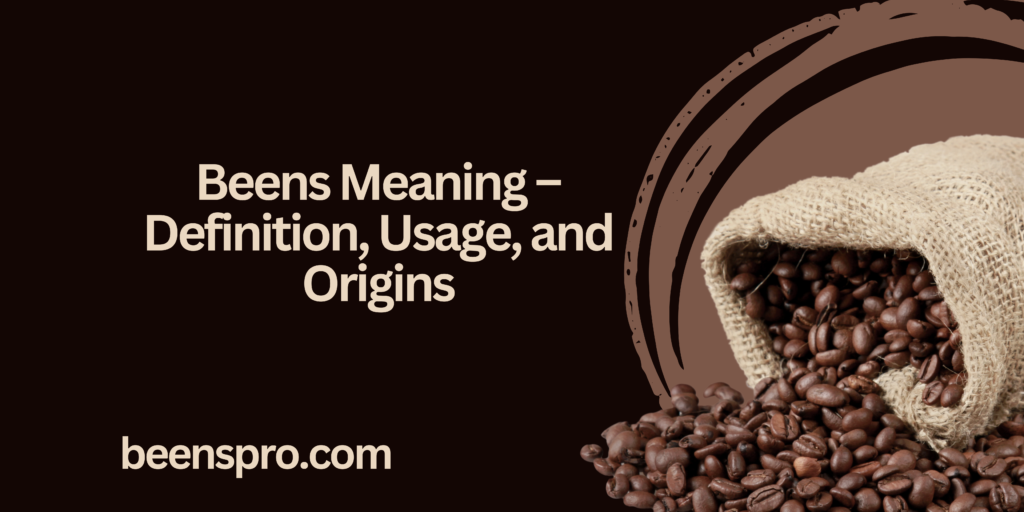
Introduction
The word Beens Meaning often causes confusion among English learners and casual speakers. Many people wonder, “What does beens mean?” and whether it is a legitimate word in the English language. While some may use it informally, it is not commonly recognized in standard English. This article will explore the definition of beens, its potential origins, how it is used, and how it differs from similar words like “been” and “beans.” Additionally, we will examine its role in slang, literature, and linguistic evolution.
What Does Beens Mean?
The term beens does not hold a standard definition in English dictionaries. It is often a misspelling or misinterpretation of the word beens, which is the past participle of “be.” Alternatively, some may confuse it with beans, referring to edible seeds.
In modern usage, “beens” is rarely used in professional or academic contexts. Instead, it appears in informal speech or regional dialects where grammar is less rigidly enforced.
Beens vs. Been – Understanding the Difference
Many people mix up beens and been, but these words are not interchangeable.
- Been is the correct past participle of “be.” Example: I have been to the market.
- Beens is generally incorrect and rarely found in proper grammar.
Some informal dialects may use “beens” in a non-standard way, but it is not grammatically correct in mainstream English.
Is Beens a Real Word in English?
Linguistically, beens is not recognized as an official word in major English dictionaries. However, language evolves over time, and certain words gain meaning through regional and colloquial usage. It is possible that in some communities, “beens” carries a specific slang meaning, but it is not widely accepted.
The Origin and History of Beens
While beens lacks an official history in linguistic records, the mistaken usage of the term likely stems from phonetic errors or dialect influences. Many English words have evolved due to frequent mispronunciations, but “beens” has not yet achieved this status.
Beens in Old and Modern English
Historically, English has undergone major changes, with words shifting in spelling and pronunciation. However, no records indicate that beens was a recognized term in Old English or Middle English. Its usage today is mostly a result of grammatical mistakes rather than historical linguistic evolution.
How to Use Beens in a Sentence?
Since beens is not a standard English word, it is best avoided in formal writing. Here are some incorrect and correct sentence examples:
- Incorrect: I have beens to New York before.
- Correct: I have been to New York before.
If beens were to be accepted in certain dialects, it might appear in highly informal speech, though such usage is not standard.
Beens in Slang and Regional Usage
In some slang contexts, non-standard words emerge over time. However, there is no strong evidence that beens has a commonly accepted meaning in slang. Some online communities may use it humorously or mistakenly, but it is not an established slang term.
Beens in Different Languages and Translations
While beens is not formally recognized in English, non-native speakers may still seek its meaning in their native languages.
- In Urdu: No direct translation exists, but it is often confused with been.
- In Hindi: The same confusion occurs, with “beens” mistakenly translated as “been” or “beans.”
Beens and Its Related Words

Since “beens” is not a recognized term, it is important to identify its closest alternatives:
- Synonyms: “Been,” “existed,” “occurred.”
- Antonyms: “Never happened,” “not existed.”
Common Phrases and Idioms with Beens
Currently, no common idioms use “beens.” However, if mistaken for “been,” it might appear in phrases like:
- “I’ve been there and done that.”
- “She has been working all day.”
Conclusion
Understanding the meaning of beens helps avoid common grammatical mistakes. While some words evolve over time, beens remains an incorrect term in standard English. To ensure proper grammar and effective communication, always use been in place of beens.
FAQs
Is “Beens” a Correct Word in English?
No, “beens” is not a standard word in English. It is often a mistaken form of “been.”
What Does Beens Mean in Slang?
There is no confirmed slang meaning for “beens.” Some might use it informally, but it is not widespread.
How Can I Use Beens Correctly in a Sentence?
Since “beens” is not grammatically correct, you should use “been” instead.
Why Do People Search for the Meaning of Beens?
Many people confuse beens with been or beans. This confusion leads to online searches for clarification.
What Are Some Alternative Words for Beens?
The correct term is been when referring to the past participle of “be.” If referring to food, “beans” is the appropriate word.
